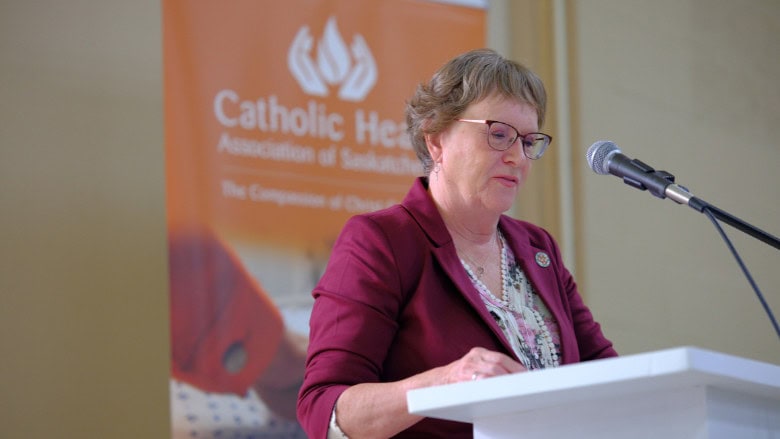
Nancy Philips – Photo Credit Blake Sittler
By Deacon Eric Gurash
The Catholic Health Association of Saskatchewan (CHAS) gathered October 23–24 at Resurrection Parish in Regina for its annual conference, drawing together Catholic health leaders, ethicists, and ministry partners from across the province. The two-day event titled “Pilgrims of Hope: Nurturing Life, Healing the Wounded” explored the intersection of faith, healing, and human dignity through a synodal lens.
Among this year’s presenters was Mike Carotta, an educator and consultant with Whole Hearted, a program dedicated to fostering mental health ministry in Catholic parishes. Carotta’s focus on the healing power of presence resonated deeply with participants.
“It just struck me how important a listening presence is for people,” said Mary Heilman, ethicist for CHAS. “That’s something we need in our parishes, in our healthcare facilities, and all around the world; to just be able to take the time to listen.”
Heilman added that the CHAS convention is always a highlight of her year, bringing together colleagues and friends from across Saskatchewan: “I get to see my friends becoming friends with each other, and that is just a wonderful feeling.”
The theme of belonging extended into conversations about reconciliation, inclusion, and community health.
“We talked about othering; how our society and institutions create divides and make some people feel like they don’t belong,” reflected participant Corey Miller. “As a Catholic community, we need to create environments and processes that make all people feel welcome—from a hospitality perspective, as well as a place where they can come and heal.”
This year’s conference also included the presentation of the CHAS Mission Award to Jerry Fitzgerald, Hospital Chaplain for the Archdiocese of Regina. The Mission Award honours individuals who exemplify outstanding service in Catholic health care in Saskatchewan. Jerry’s service has included work in Mental Health and Addiction programs, as well as chaplaincy and spiritual care.
The conference keynote featured Sebastian Gomes, a Canadian journalist, formerly of Salt and Light TV, who is now the executive editor of Audio and Video at America Magazine. Gomes, having spent years covering the Synod process in Rome, highlighted Pope Francis’ emphasis on dialogue, encounter, and putting people before ideology, a message that struck a chord with Catholic health leaders.
“Sebastian Gomes’s articulation of the continuity between Francis and Leo XIII, and where Catholic health fits in this space of dialogue, is really important,” said Cameron Choquette, president of the CHAS board of directors. “It’s an opportunity for us to articulate our values and understand how the papacy influences Catholic health through the teachings of the Pope.”
For Blake Sittler, another participant, Gomes’s reflections brought renewed meaning to Pope Francis’s well-known image of the Church as a “field hospital.”
“A field hospital is incredibly dirty, busy, messy. It’s not perfect, but it’s essential,” Sittler said. “Whether it’s the work we do in the Church or in Catholic health care, we shouldn’t let the perfect get in the way of the good. There’s a lot of good we can do together with staff and communities who share that same desire to help people.”
Gomes, speaking the evening before the CHAS conference at a diocesan event open to the public, remarked on the cultural shift that the synodal path invites the Church at all levels, to engage in.
“Synodality is not an issue or a program or an agenda, but a culture,” he said. “The real question is whether we are open to building that culture and open to conversion. Conversion doesn’t happen when a decision gets made, it happens through meaningful relationships.”
As Gomes related, our shared baptism becomes the foundation for just such a shift.
“Baptism gives all of us the freedom to speak, to act, and to participate in the mission of the Church,” Gomes said. “Even if a decision is one I totally disagree with, because of the experience, because we’re now friends, because I trust the process, I can accept it, and we can move forward together.”

